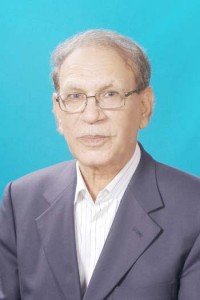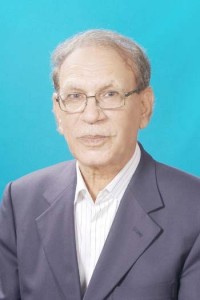 Mohammad Jamil
Mohammad Jamil
mjamil1938@hotmail.com
Pakistan has ultimately decided to move the Court of Arbitration (CoA) against India for committing blatant breaches of the Indus Waters Treaty (IWT) 1960 by erecting 330MW Kishanganga Hydropower and 850MW Ratle Hydropower Projects with objectionable designs. Pakistan is concerned that in the event projects are completed, they will adversely impact water flows to reach the lower riparian country. Khawaja Asif, Federal Minister for Water and Power, had confirmed the development in his twitter account saying that the Nawaz government has taken this decision after consulting all stakeholders. “We have decided to take the issue to the Court of Arbitration,” he said. The minister said that talks with India continued for two and half years at the Permanent Commission of Indus Waters (PCIW) on both the projects, but could not yield results.
However, India had invited Pakistan’s concerned authorities to discuss the dispute under IWT and Pakistan’s eight-member delegation headed by Secretary Water and Power Younas Dhagha had visited India for two days (14-15 July). However, the talks failed, and Pakistan decided to take the issue to the Court of Arbitration. India is in the process of building the Kishanganga Hydropower on Ganga tributary that will impact the water flows in Jhelum River. India is also currently constructing MW Ratle hydropower project on the Chenab River which will also hurt Pakistan’s water interests. Pakistan had raised three objections on Kishanganga project’s design saying that the pondage of the project is 7.5 million cubic meter is excessive and it should be one million cubic meter. Pakistan also wants India to raise intake by up to 4 meters and also raise spillways up to 9 meters high.
And on the issue of Ratle Hydropower plant, Islamabad raised four objections. Pakistan wanted India to maintain free board at 1 meter whereas India wants to keep it at 2 meters. In addition India wants to keep the pondage of 24 million cubic meters but Pakistan wants the pondage should of 8 million cubic meters. Pakistan also wants the intake of the project should be raised by up to 8.8 meters and it spillways should be raised by up to 20 meters. The decision to move the World Bank for appointment of neutral experts has now been abandoned after an internal debate of the top officials of the ministry of water and power and legal fraternity headed by Pakistan’s Attorney General of Pakistan, as 7-member judges of Arbitration Court could not be influenced by any of the party to the dispute.
In May, 2016, Indian Prime Minister Narendra Modi had issued orders to change direction of River Chenab to Indian River Beas, and complete the under-construction Jaspa Dam on war-footing, which is violation of Indus Water Treaty. If completed it would make River Chenab dry from Marala Head to Trimo, render that part of the river completely dry or substantially reduce the water. According to India, the treaty allows India to draw power from the rivers and that would mean storing some water to flush the silt that is accumulated in the power projects. This was not originally an issue in 1960, as it was not thought out. According to Pakistan, the treaty doesn’t allow India to store water and “rob” Pakistan of its water. When Indus Water Commissioner Mirza asif Beg was contacted by the daily, he said that he was not aware; however he promised to investigate the matter.
Pakistan in the past has been the loser because of such lackadaisicalness on the part of Pakistani officials. Kishanganga project was planned by India before 2005; and since then many meetings were held between India and Pakistan officials but without any results. In 2010, Pakistan had appealed to the Hague’s Permanent Court of Arbitration (PCoA), complaining that the Kishanganga Hydroelectric Plant violates the Indus River Treaty by increasing the catchment of the Jhelum River and depriving Pakistan of its water rights. In June 2011, the PCoA visited both the Kishanganga and Neelum-Jhelum Projects. In August 2011, they ordered India to submit more technical data on the project. India had previously reduced the height of the dam from 98 m (322 ft) to 37 m (121 ft). In February 2013 The Hague ruled that India could divert a minimum of water for their project.
The problem is that by being engaged in negotiations with Pakistan, India cunningly secures sufficient time to continue the unnoticed construction of its controversial dams. For that reason India balks at the indulgence of third party in all water related issues between both the countries, and instead it insists on bilateral talks. Earlier, Pakistan had invoked article IX of 1960 Indus Basin Water Treaty due to inconclusive talks on Baglihar dam. The World Bank had nominated the arbitrator with the consent of both the countries, but the verdict was in favor of India. The treaty prohibits the two countries from undertaking any obstruction to cause change in the volume of daily flow of water, and in concrete terms bars India, being upper riparian state, from constructing any reservoirs on the western rivers except for limited storage to control floods.
India’s stance on Kishanganga Project is that it is meant for power generation, and no canal would be dug out to take water from the dam for irrigation purposes, and that the withheld water would be released to Pakistan after using for power generation. The question is who will guarantee that no canal will be taken out, and that the flow of water will not be disturbed. There is a perception that India has planned these violations of Indus Basin Treaty to create water shortages and to sow seeds of disharmony between Pakistan’s provinces, as they are already embroiled in the nasty wrangle over water distribution due to water shortages. The international community should not turn a blind to India’s machinations because of its size and 1.2 billion population, as the region is already considered a flashpoint in regard to Kashmir dispute.




